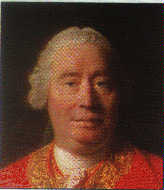







 |
 |
 |
 |
 |
 |
 |
 |
![]()
The Modern Philosophy Graduate Seminar examines significant figures of 17th- and 18th-century philosophy, with emphasis on a careful examination of texts. Although the seminar provides a general overview of philosophic issues of the period, it also focuses on a particular theme. This year's theme centers on the concept of representation.
Texts: The Longman Standard History of Modern Philosophy,
ed. Daniel Kolak and Garrett Thomson.
Classical
Modern Philosophy, Jeffrey Tlumak
|
Class date |
Topic |
Kolak/Thomson reading |
Tlumak reading |
Presenter |
|
| Jan. 16 | Class
cancelled due to weather |
||||
| Jan. 23 | A. B. |
The
Background: Galileo, Bacon Descartes: Meditations I - III |
17 - 29, 180 - 203 38 - 57 |
1 - 38 | Dr.
Daniel |
| Jan. 30 | A. B.
|
Descartes: Meditations
IV - VI Meditations: Objections and Replies II-IV: Mersenne, Hobbes, Arnauld |
57 - 72 72 - 97 |
38 - 76 |
Dr.
Daniel Michael Deem |
| Feb. 6 |
A. B. |
Hobbes:
Leviathan Part I, Ch. I
- VII Malebranche: Search after Truth III.2.1-7, VI.2.3; Elucidations 15 |
205 - 210 (click on title on left) |
Jonathan
Jones Zach Rathke |
|
| Feb. 13 |
Spinoza:
Ethics I-II (Method,
God, Mind) |
106 - 117 |
77- 88 | Michael Long | |
| Feb. 20 |
A. B. |
Spinoza:
Ethics III-V: Passions,
Actions, Freedom Leibniz: Primary Truths, Arnauld letters, works up to 1686 |
117 - 144 144 - 154 |
88 - 105 133 - 155 |
Autumn
Hamilton Travis Hobbs |
| Feb. 27 |
A. B. |
Leibniz:
1686 - 1700 writings (e.g., Discourse
on Metaphysics) Leibniz: post-1700 writings (e.g., Monadology) |
155 - 68 168 - 77 |
155 - 173 |
Ryan
Kemp Preston Stovall |
| Mar. 2 (Friday) | First paper due in office 5:00 p.m. | ||||
| Mar. 6 |
Locke: Essay, Books I and II | 222 - 255 | 106 - 122 | Dr.
Daniel |
|
| Mar. 20 |
A. B. |
Locke:
Essay, Books III and IV Berkeley: Principles: abstraction/existence |
255 - 268 278 - 294 §21 |
122 - 132 174 - 180 |
Michael
Deem Michael Long |
| Mar. 27 |
Berkeley: Principles and Dialogues: matter/spirit/nature | 294 §22 - 320 | 180 - 192 |
Zach
Rathke |
|
| Apr. 3 |
Hume: Enquiry concerning Human Understanding,
secs. I - VI |
321 - 343 |
193 - 200 |
Ryan
Kemp |
|
| Apr. 10 |
A. B. |
Hume:
Enquiry (continued):
secs. VII - XII A Treatise of Human Nature (on skepticism and the self) |
343 - 369 358 - 371 |
199 - 208 208 - 226, 238 - 243 |
Autumn
Hamilton Travis Hobbs |
| Apr. 17 |
Kant: Critique of Pure Reason:
Space/time, categories of the understanding |
389 - 428 |
244 - 291 |
Jonathan
Jones |
|
| Apr. 24 |
Kant: Critique of Pure Reason:
Transcendental Ideas, metaphysics |
428- 463 |
291 - 352 |
Preston
Stovall |
|
| May 9 (Wednesday) | Term
paper due in
office, 5:00 p.m. |
||||
Office: Bolton 302 B
Office hours: Tuesday 2:15 - 5:00 p.m.; Thursday 2:15 - 3:30
p.m.
Phone: 845-5619 (office), 846-4649 (home)
Email:
sdaniel@people.tamu.edu
Website: http://people.tamu.edu/~sdaniel/616sy07a.html
Seminar Theme
Seventeenth- and eighteenth-century philosophers differ
significantly on what how what they know can be said to "represent"
objects in the world. Most agree that our ideas are "of" something, but
they disagree on what such a claim means, how it is justified, and
whether the "way of ideas" opens the door to skepticism or guarantees
the possibility for knowledge by providing immediate access to a world
that is inherently organized according to mental structures. This focus
on representation is central to classical modern philosophy, and it
informs much of later philosophical discussions in metaphysics and
epistemology, including the current realist/anti-realist debate.
Assignments/Presentations/Papers/Grades
At each class meeting a member of the seminar will prepare a 4- to 6-page outline of selected passages from the text and other writings by the philosopher under discussion that shed light on the seminar theme. Each student will lead the discussion twice during the semester. Together, these outline presentations count for 30% of the semester grade.
By mid-semester you will also be responsible for completing a 10-page paper on the concept of representation as addressed by one of the philosophers studied (another 30% of the final grade).
The final term paper will be a more in-depth (20-page) paper on that same topic dealing with a different philosopher than the one addressed in the short paper. For this paper, most students end up writing on a figure for whom they have prepared a presentation, but it is not required that the selected thinker be one that we study studied in class. The final paper is worth 40% of the final grade.
 Send Dr. Daniel a message:
sdaniel@people.tamu.edu
Send Dr. Daniel a message:
sdaniel@people.tamu.edu
 Go to the Texas A&M Philosophy
Home Page
Go to the Texas A&M Philosophy
Home Page
Students with disabilities are guaranteed a
learning environment that provides for reasonable accommodation of
their disabilities. If you believe you have a disability requiring an
accommodation, please contact the Department of Student Life,
Disability Services, Koldus Bldg. 126, or call
845-1637.
Students are bound by the Aggie honor code not to cheat. Submitting another student's work as one's own, copying from another student's test, and modifying a previously graded test to improve the grade are acts of scholastic dishonesty. For the definition and sanctions regarding cheating and plagiarism, see http://www.tamu.edu/aggiehonor/definitions.php.